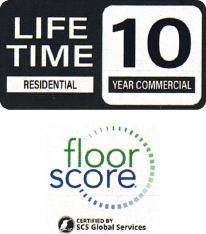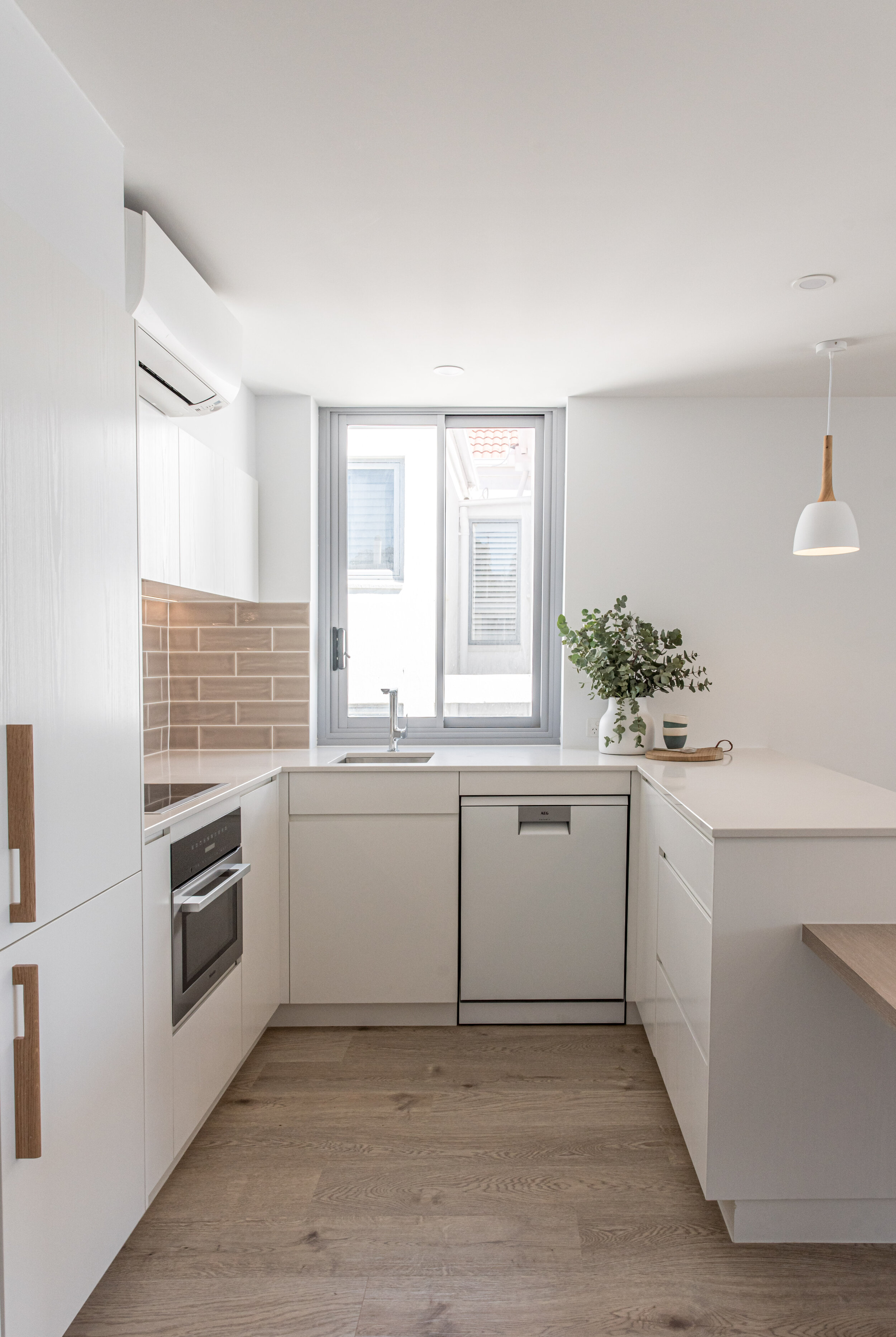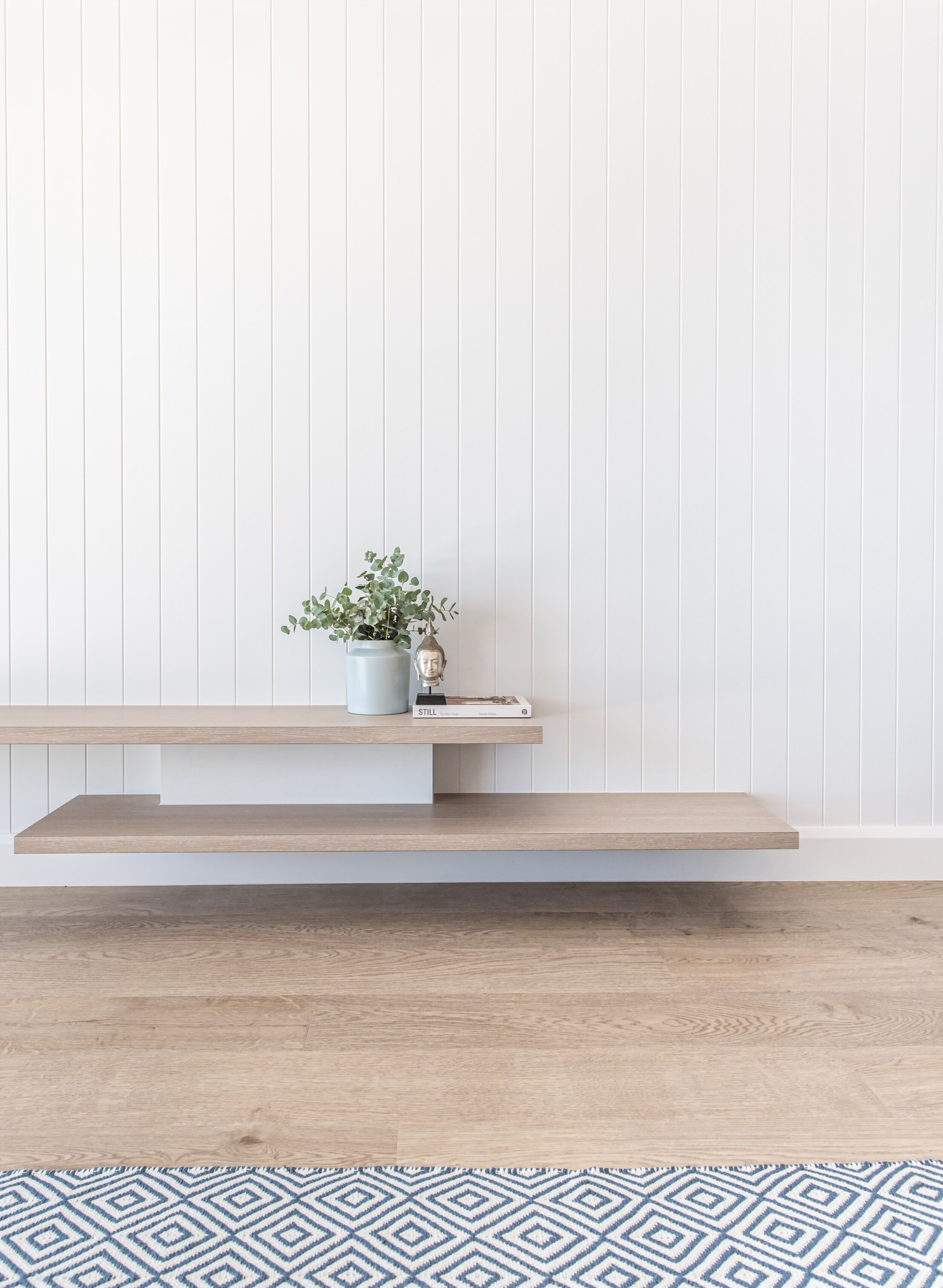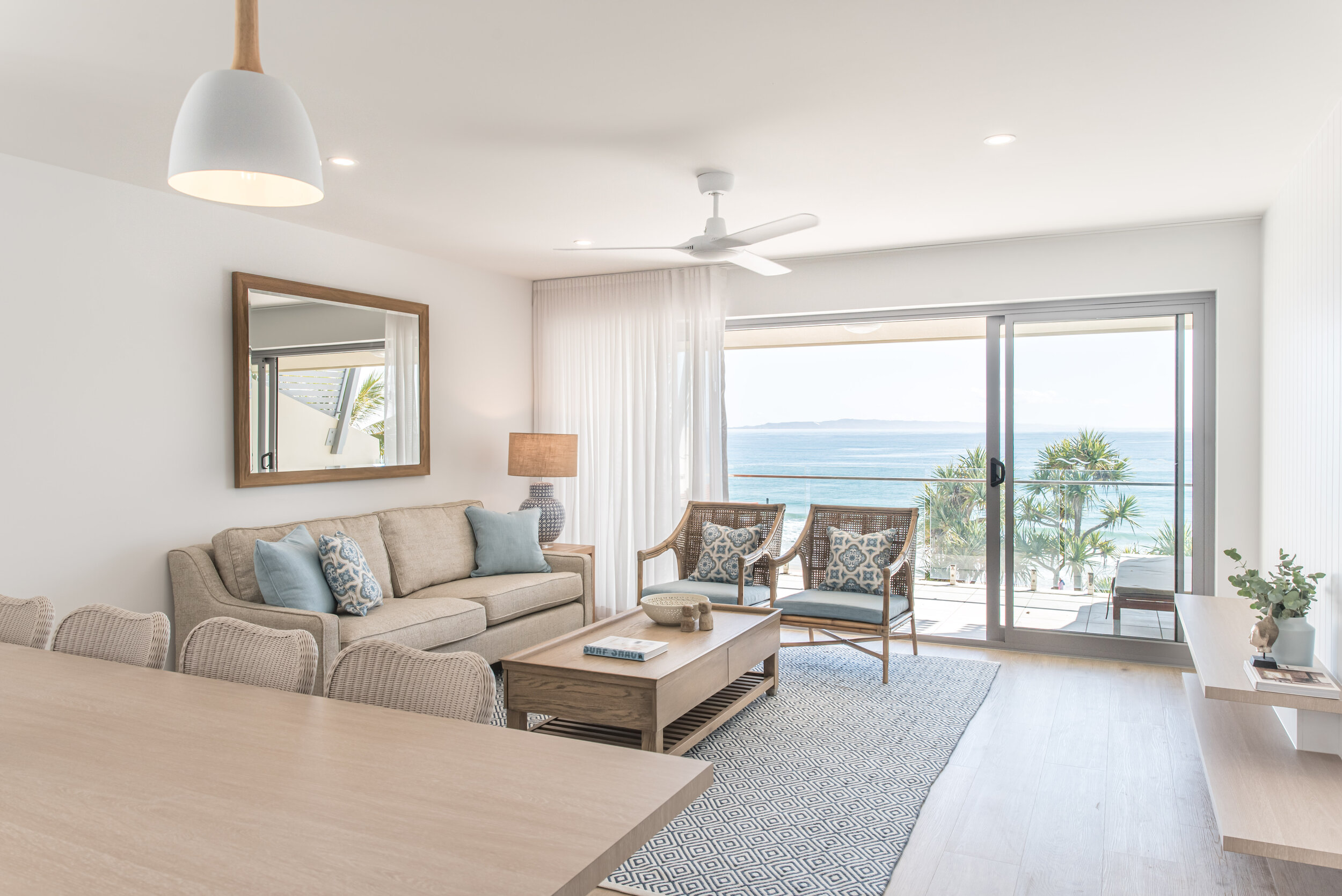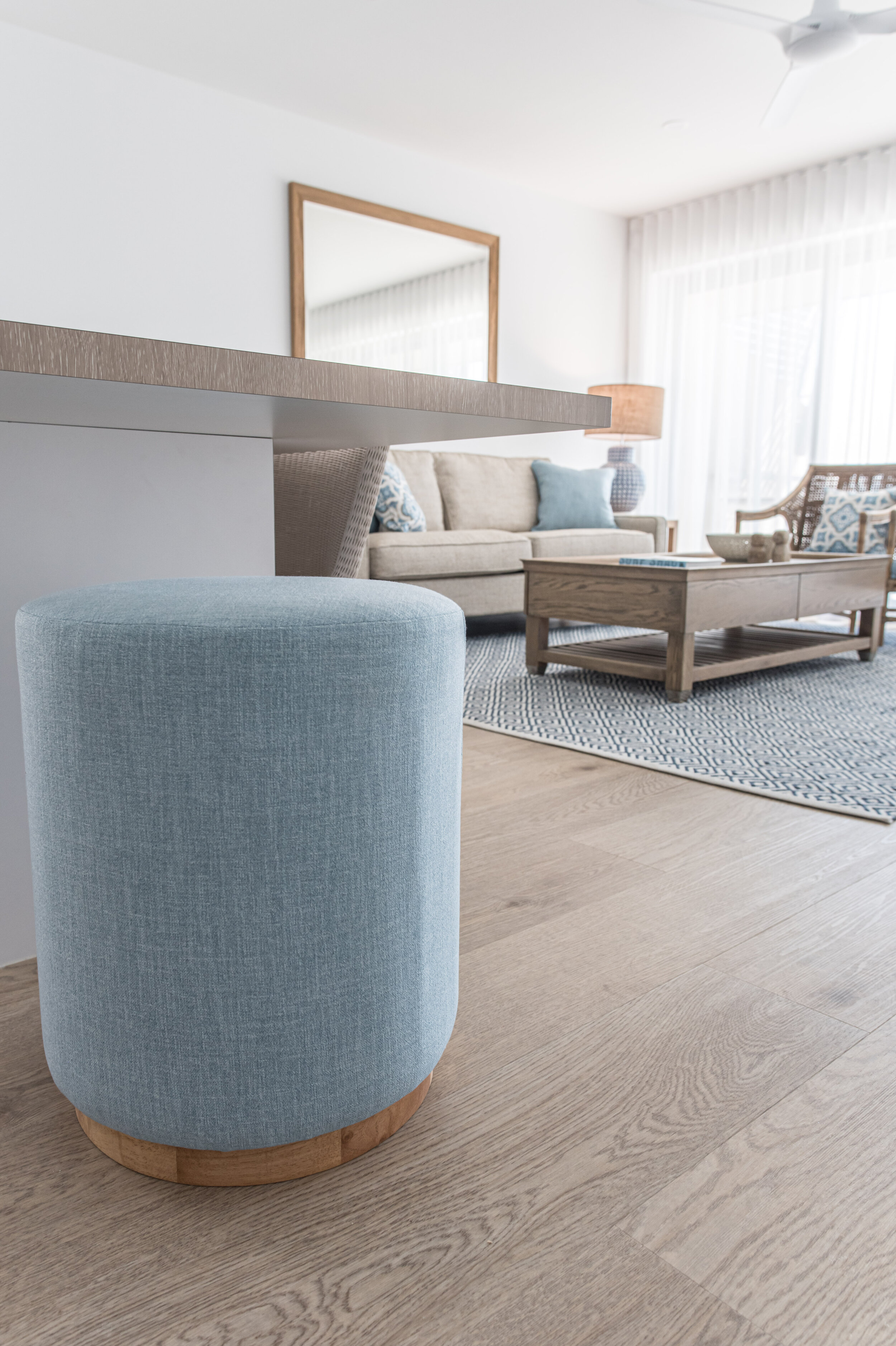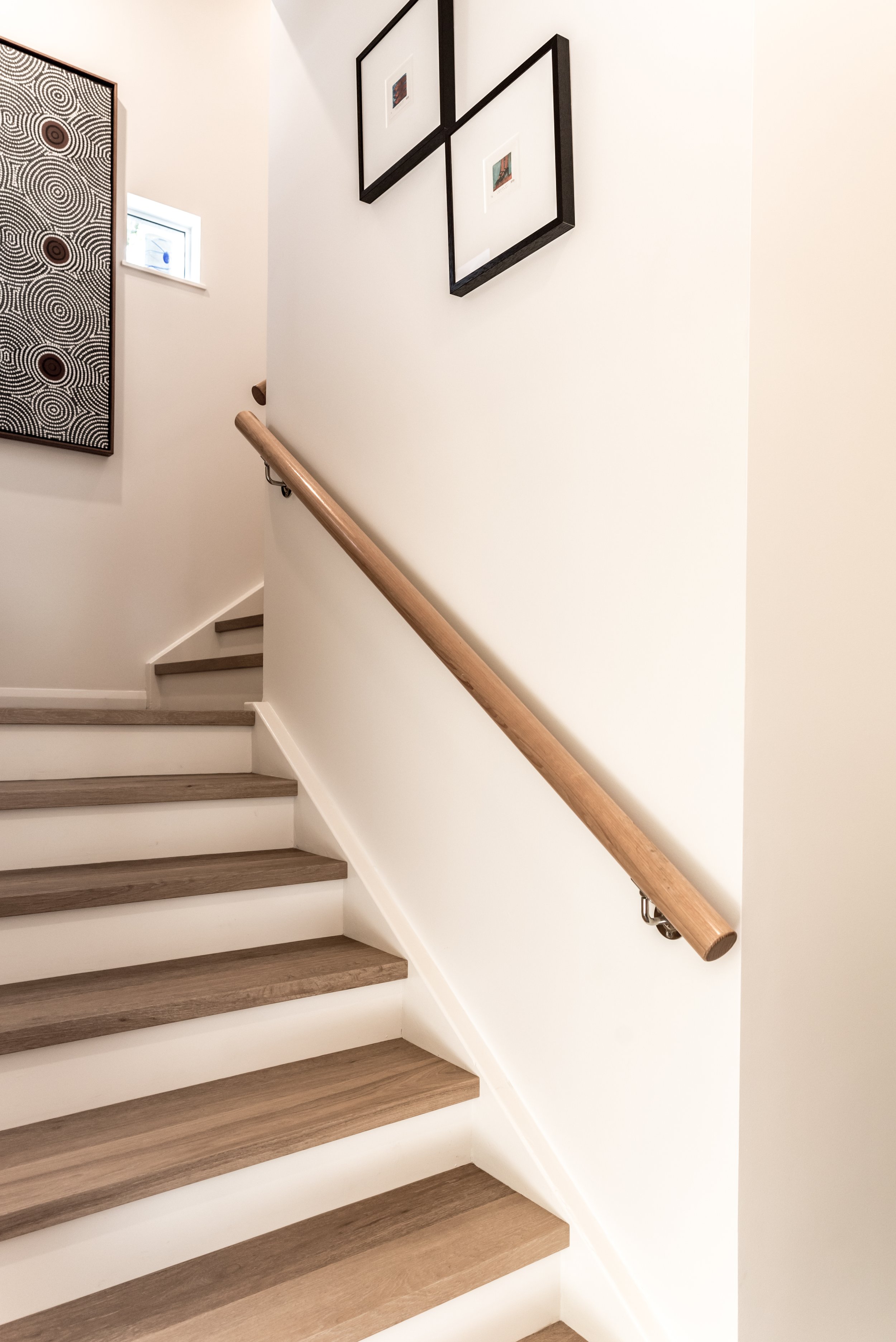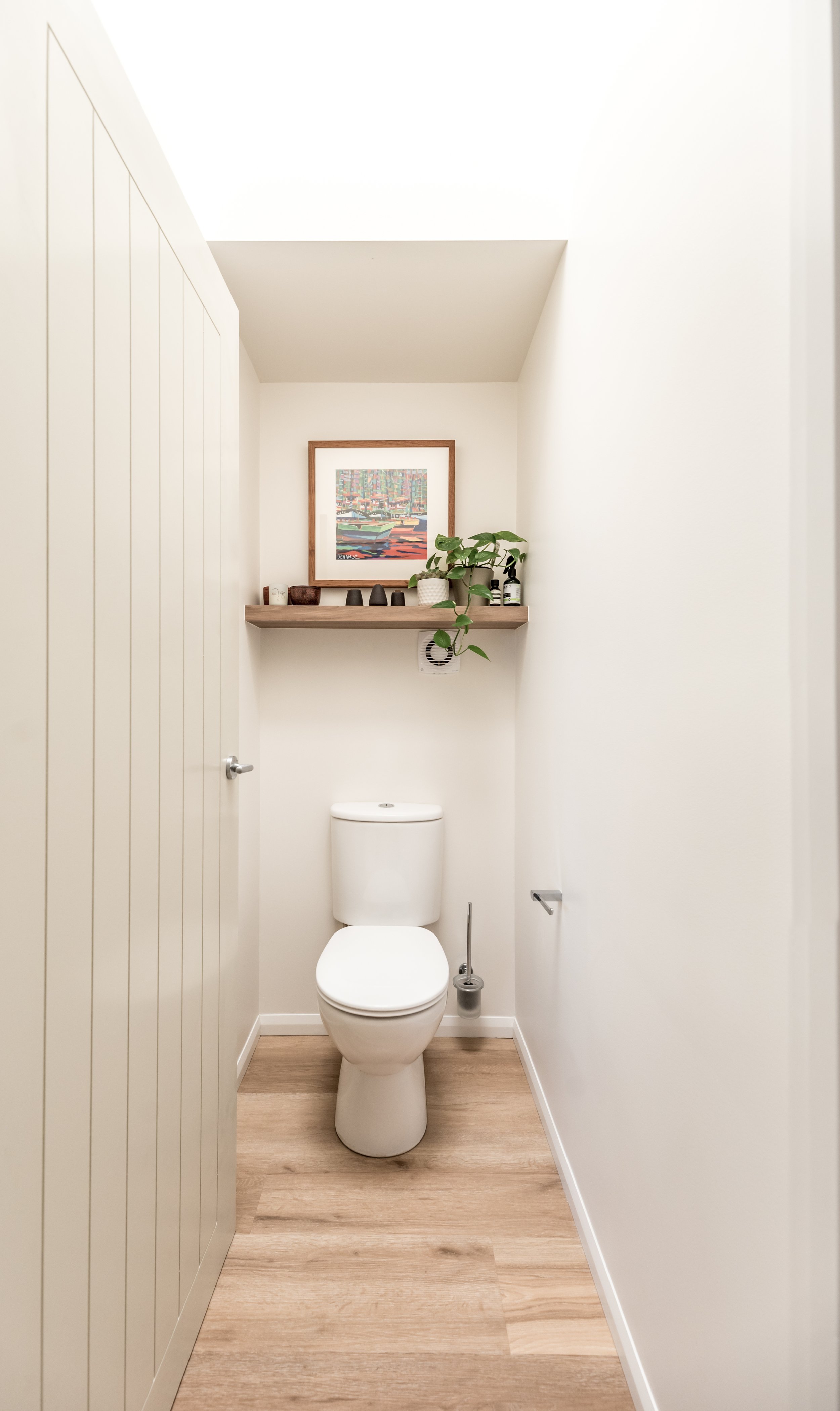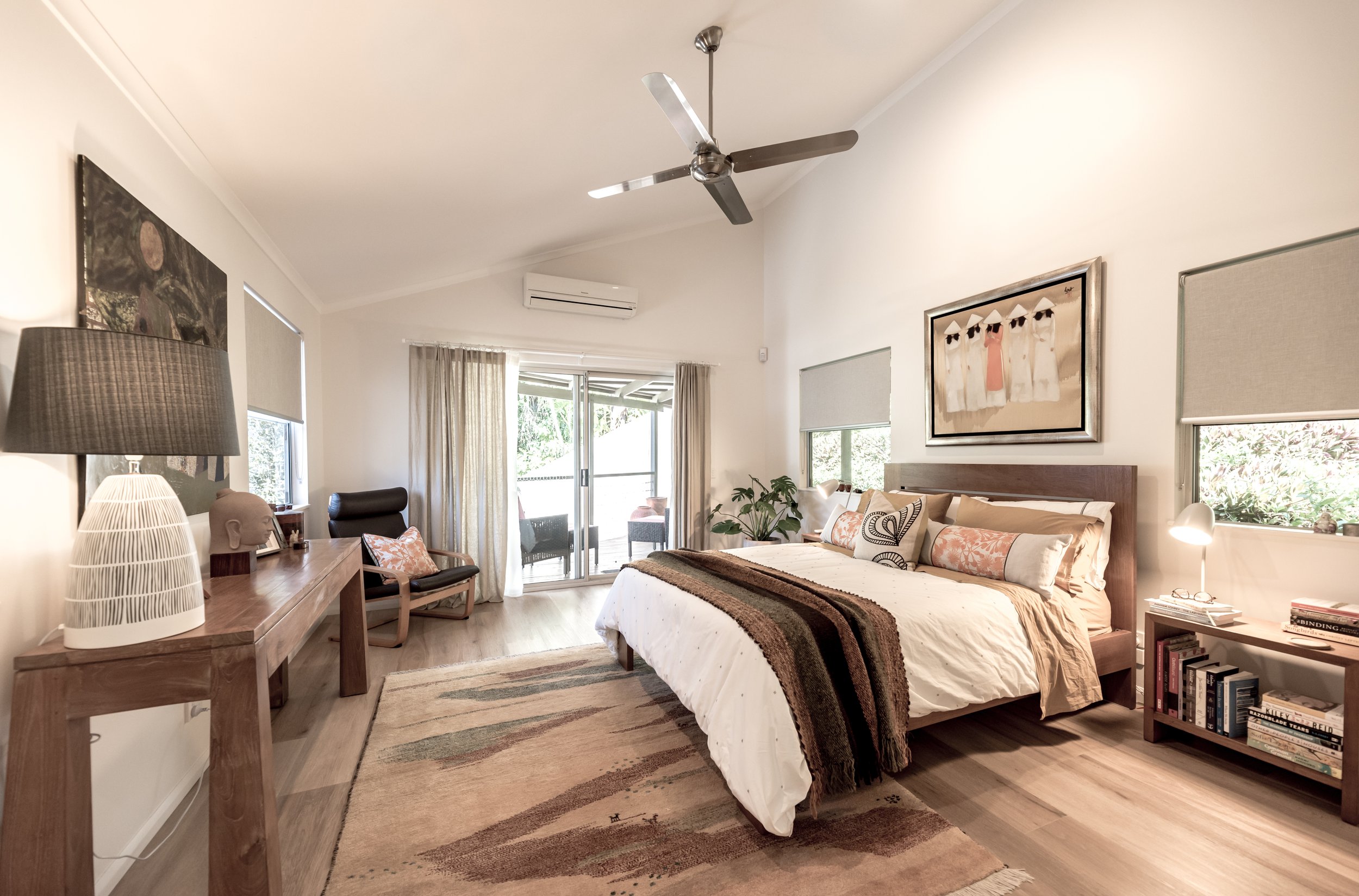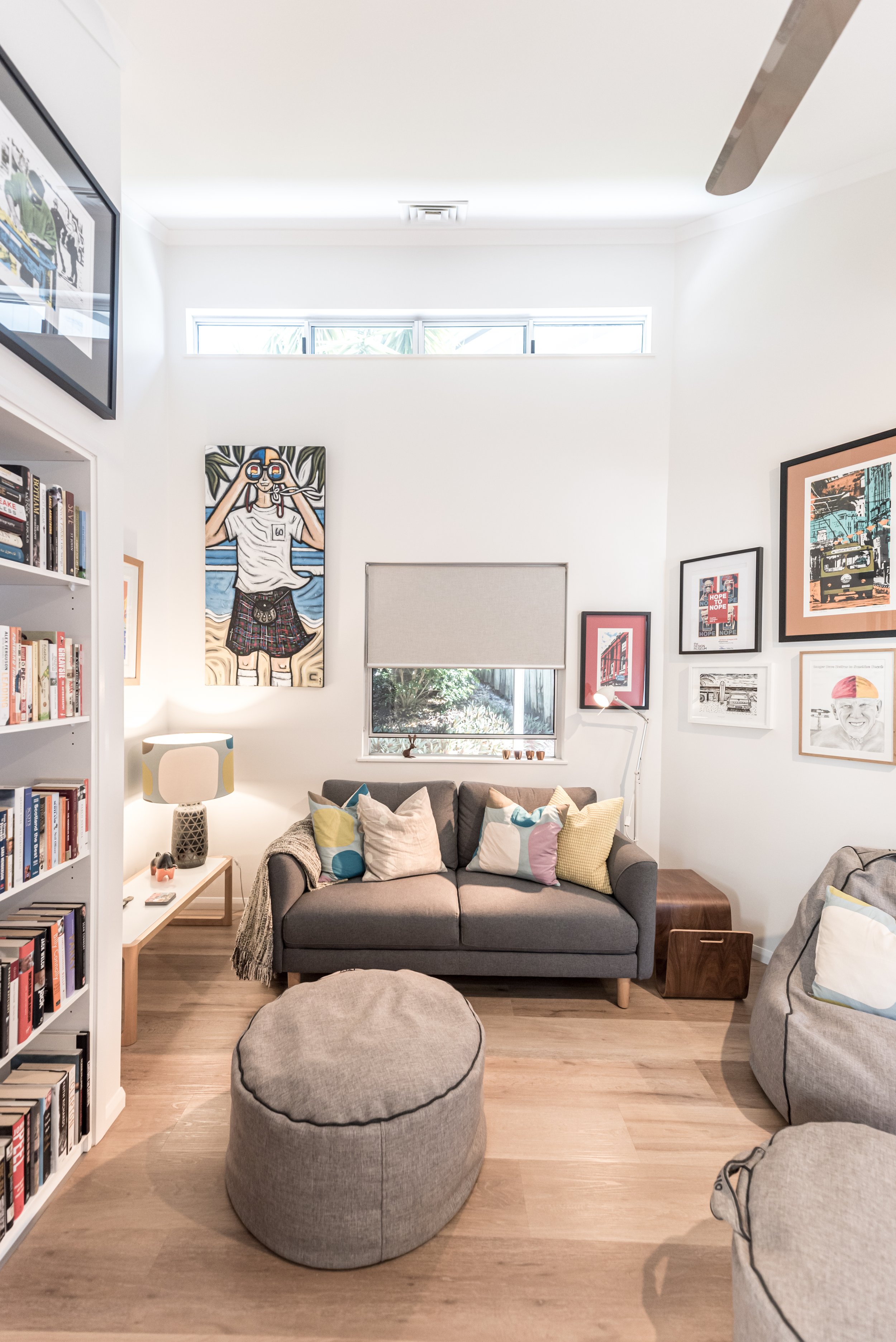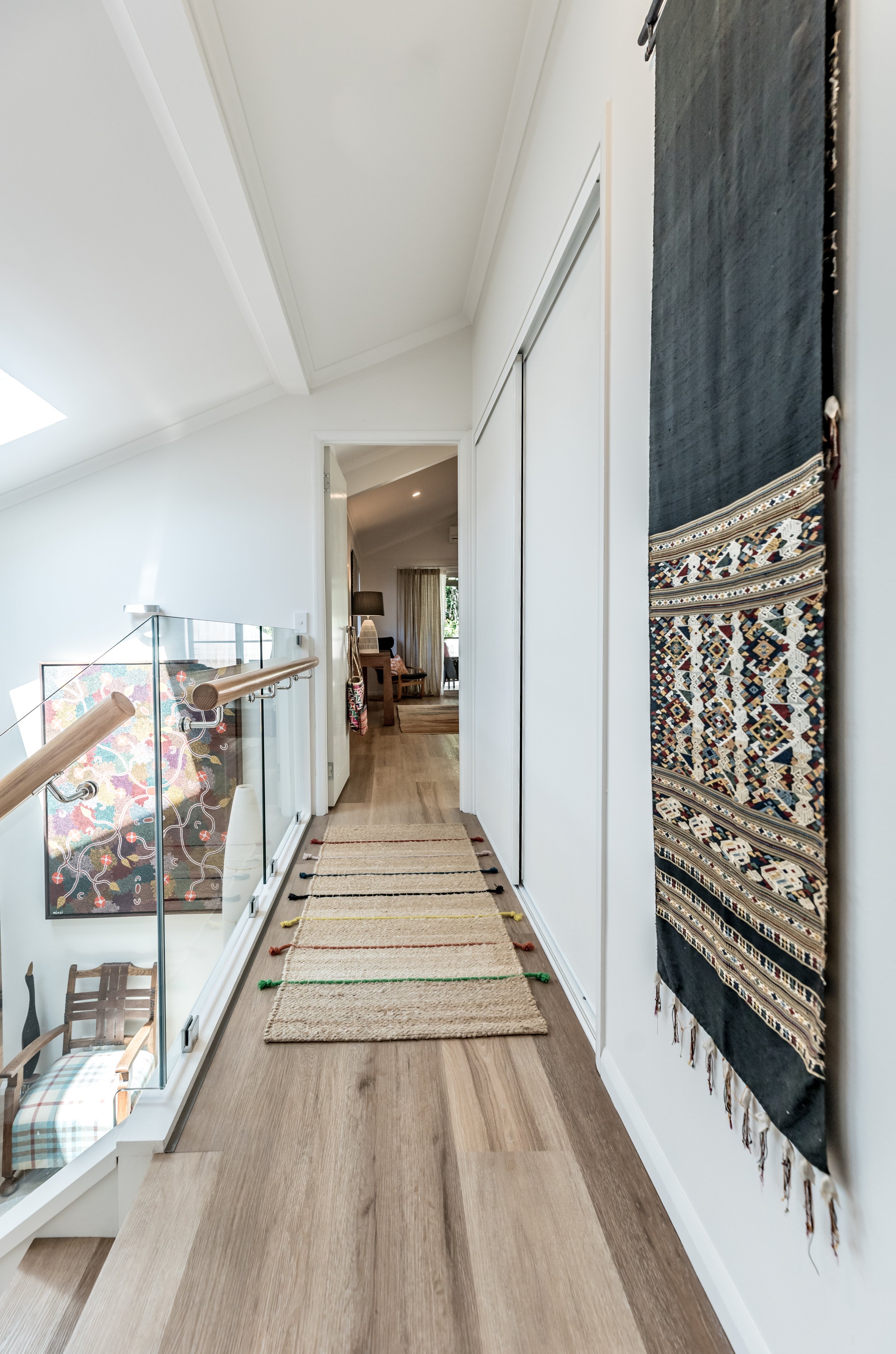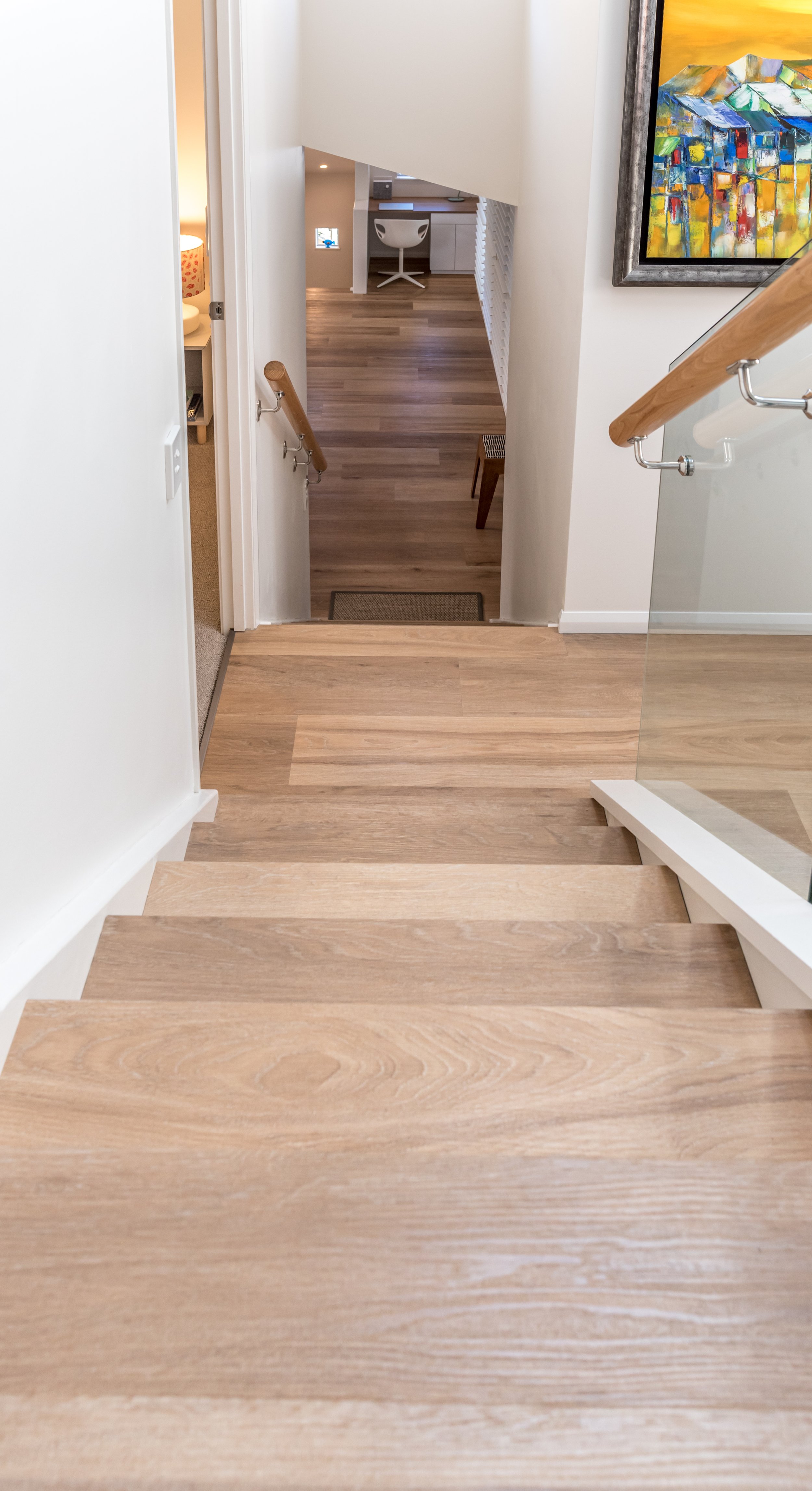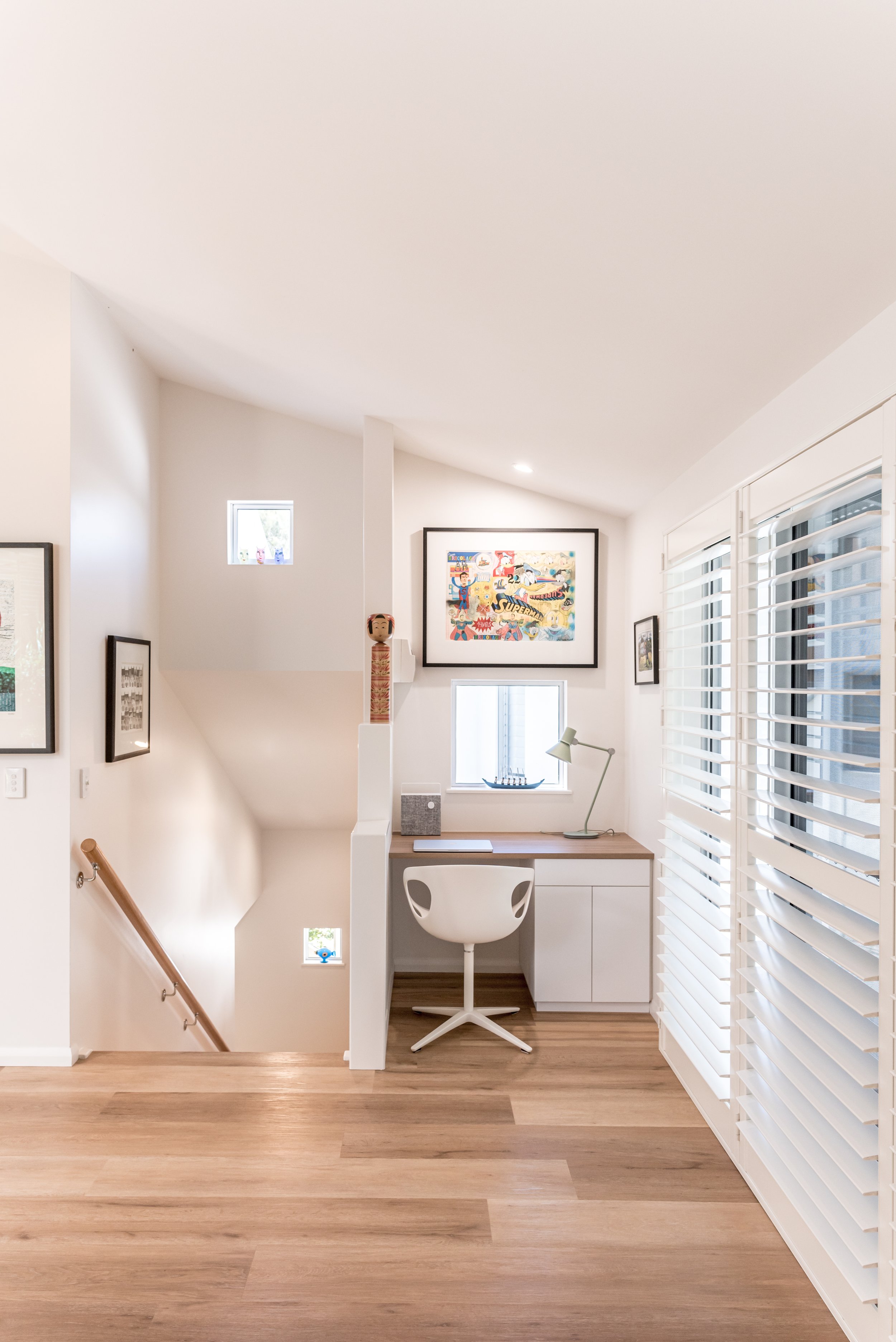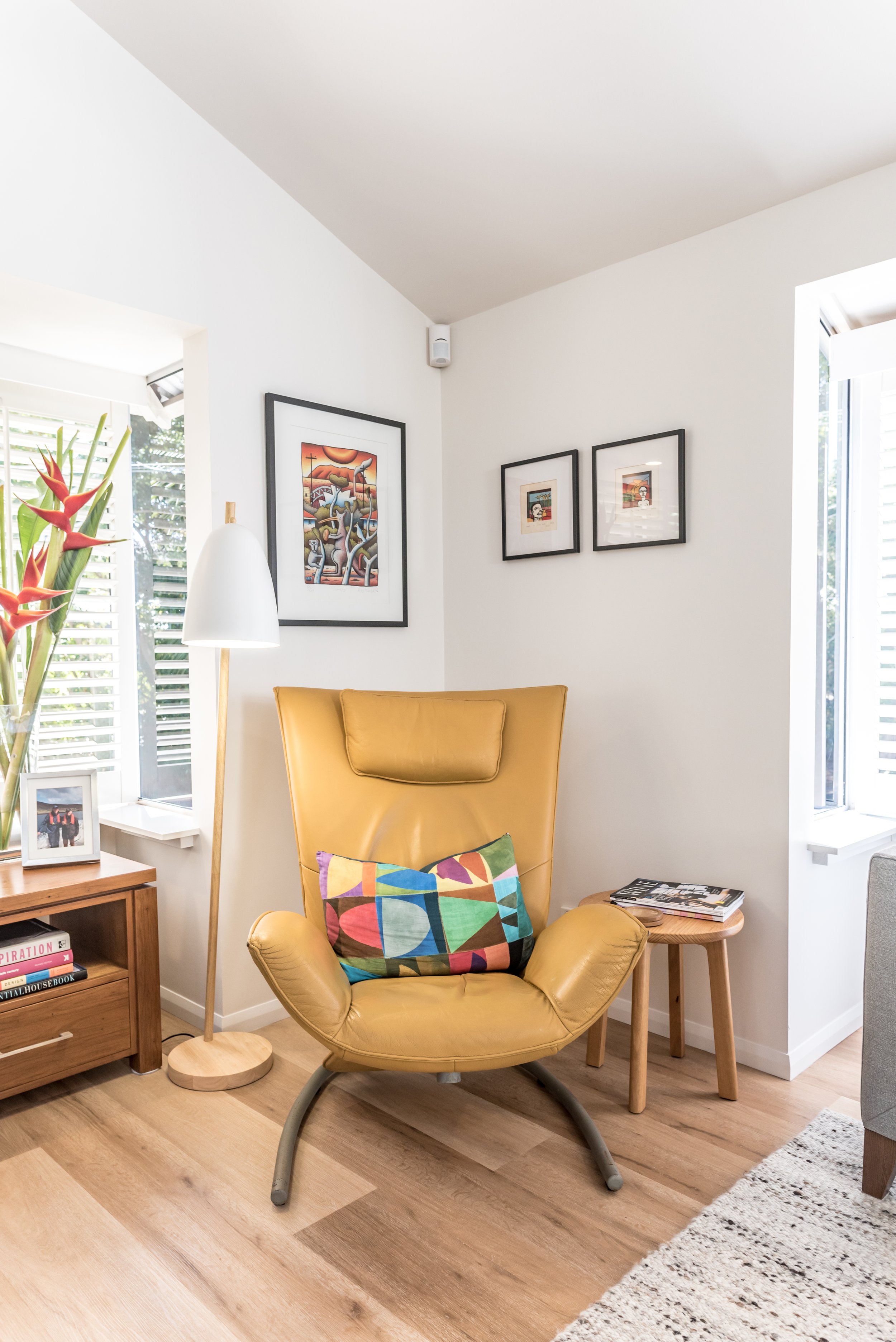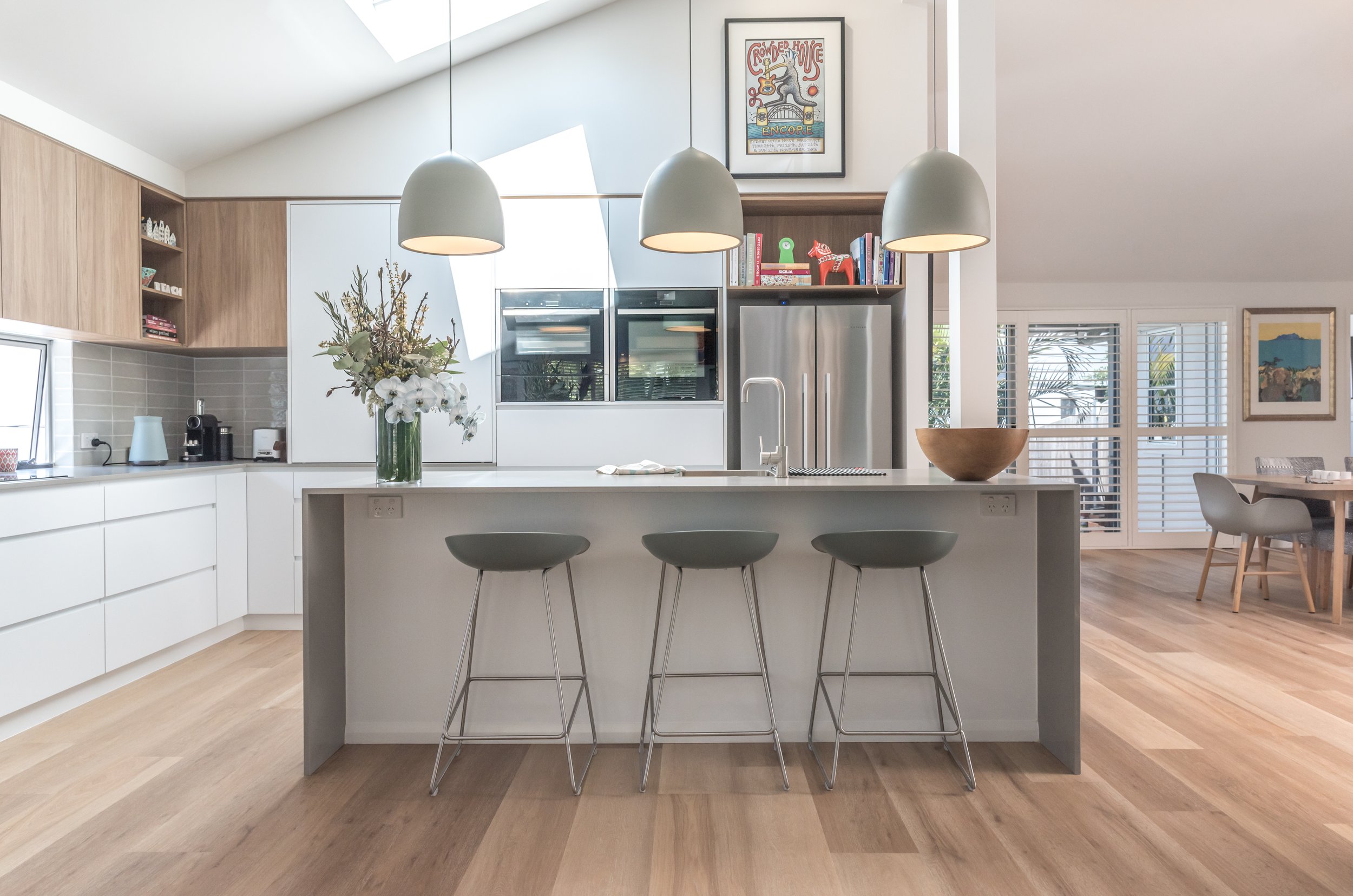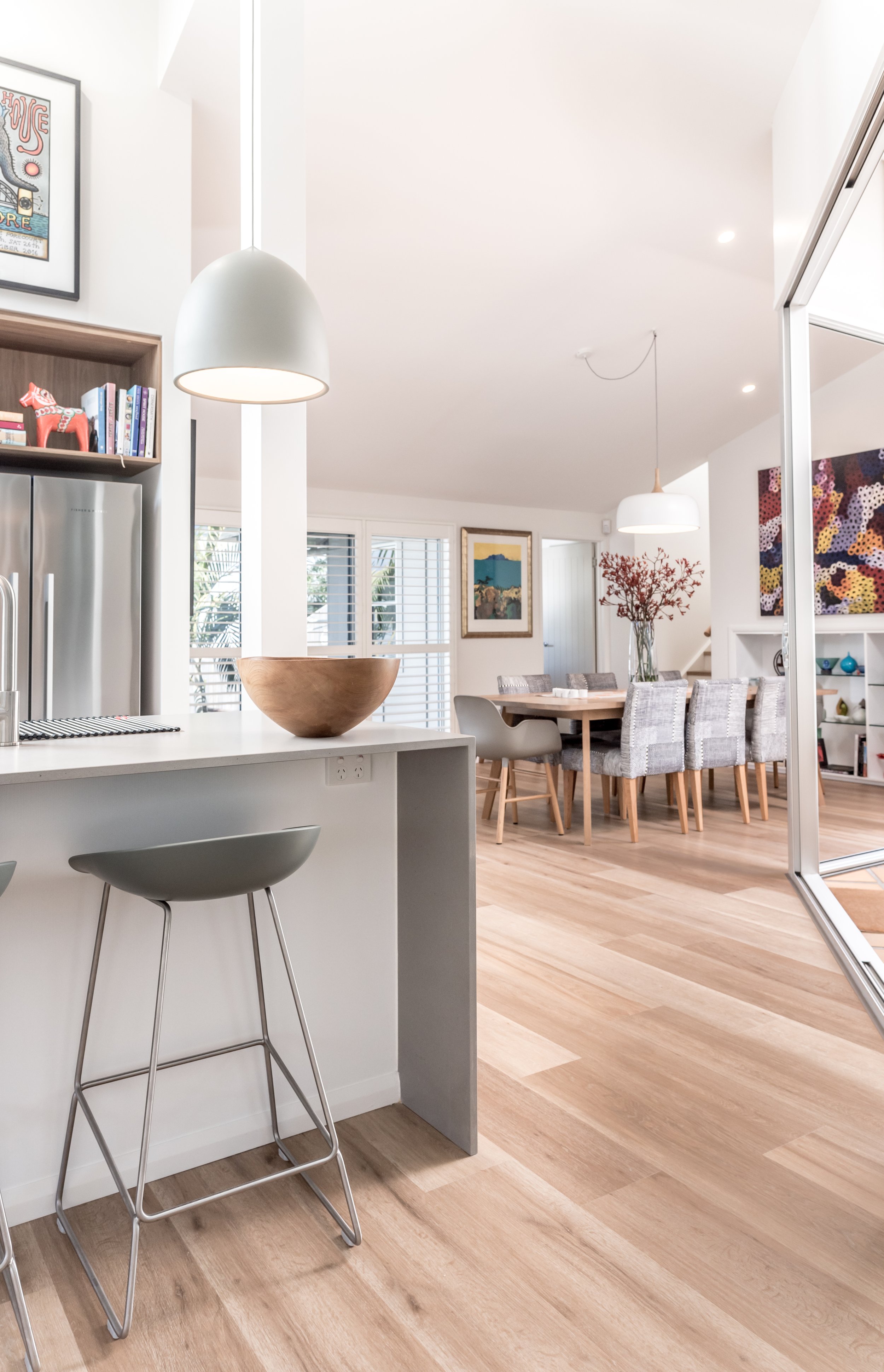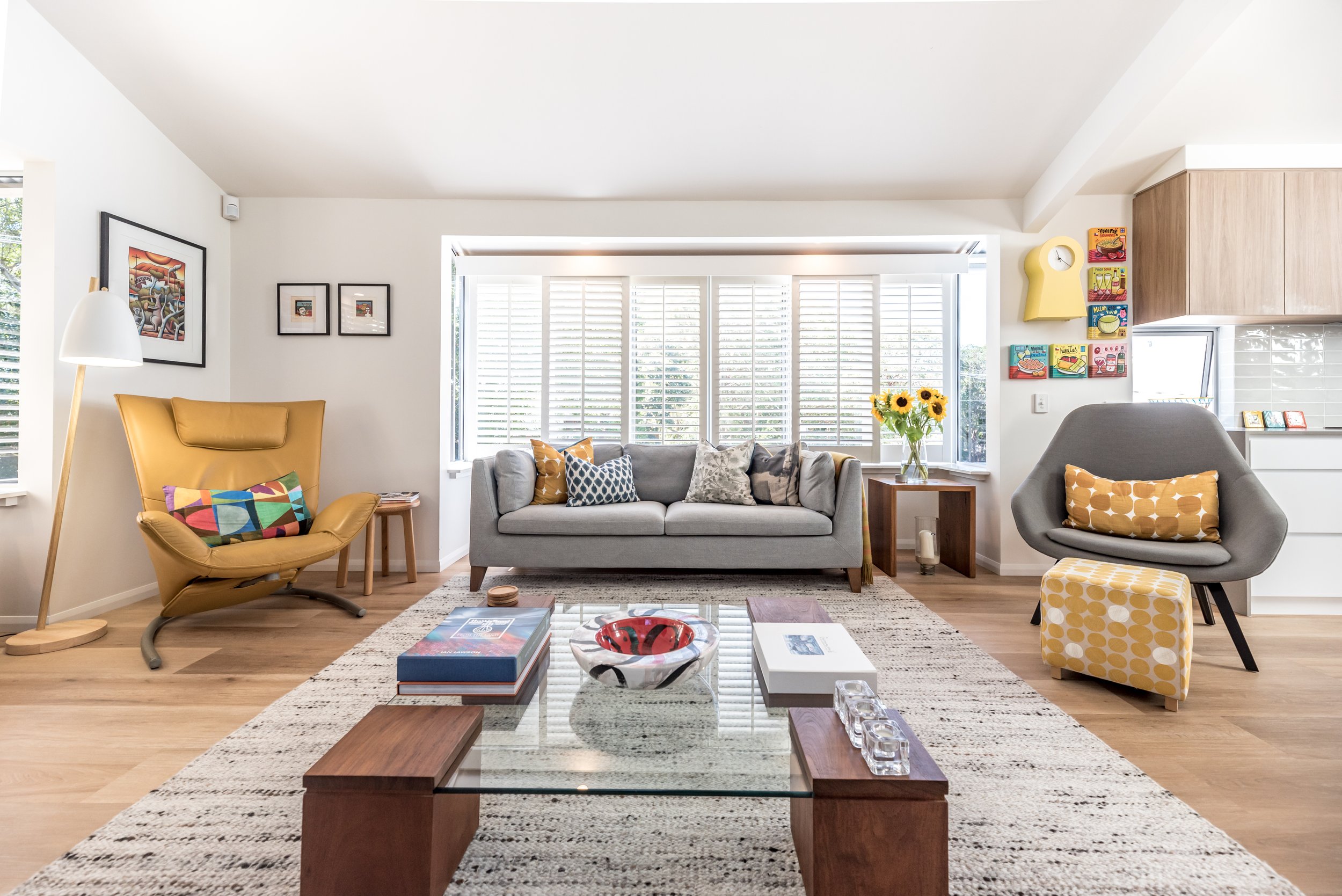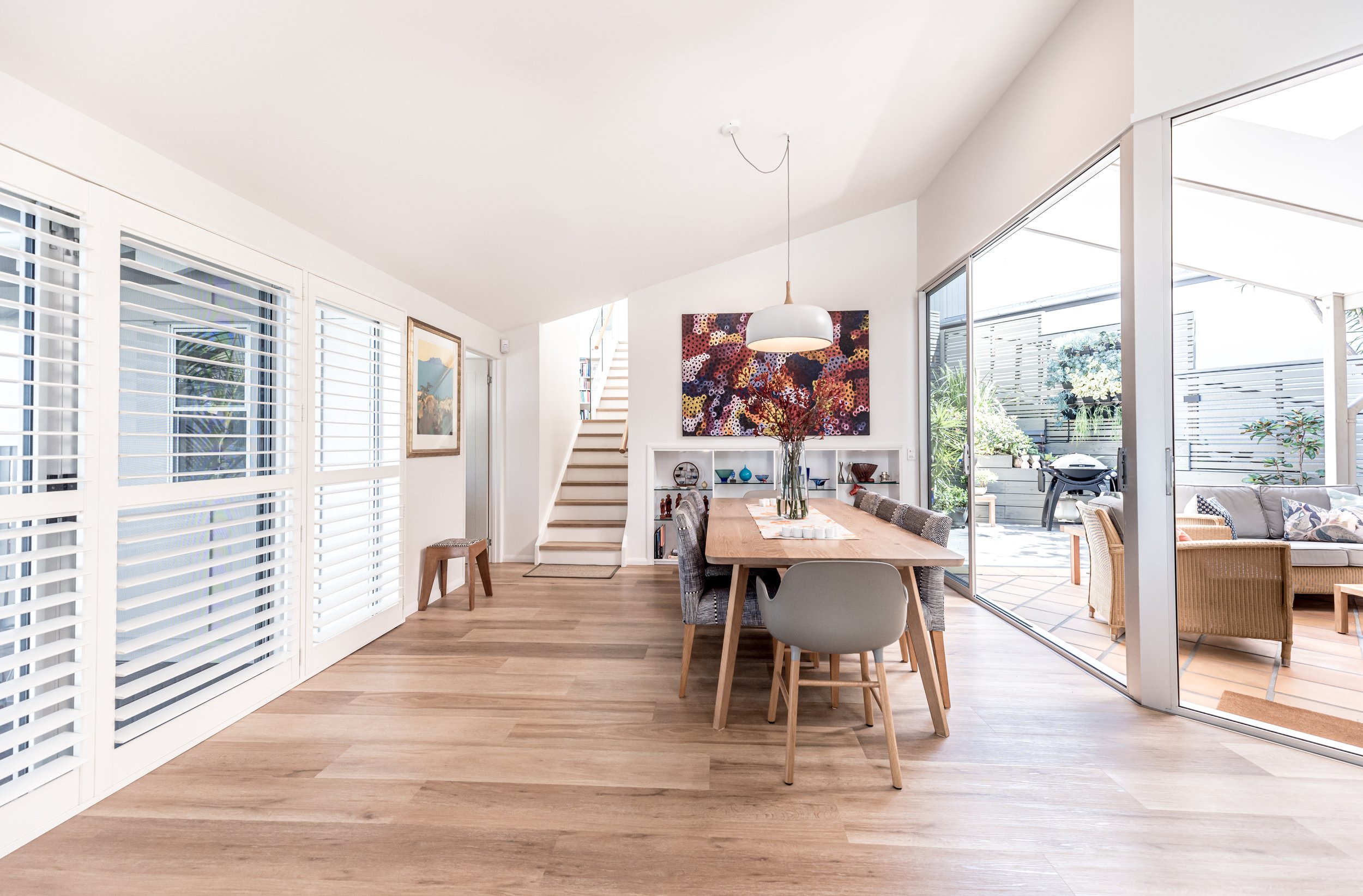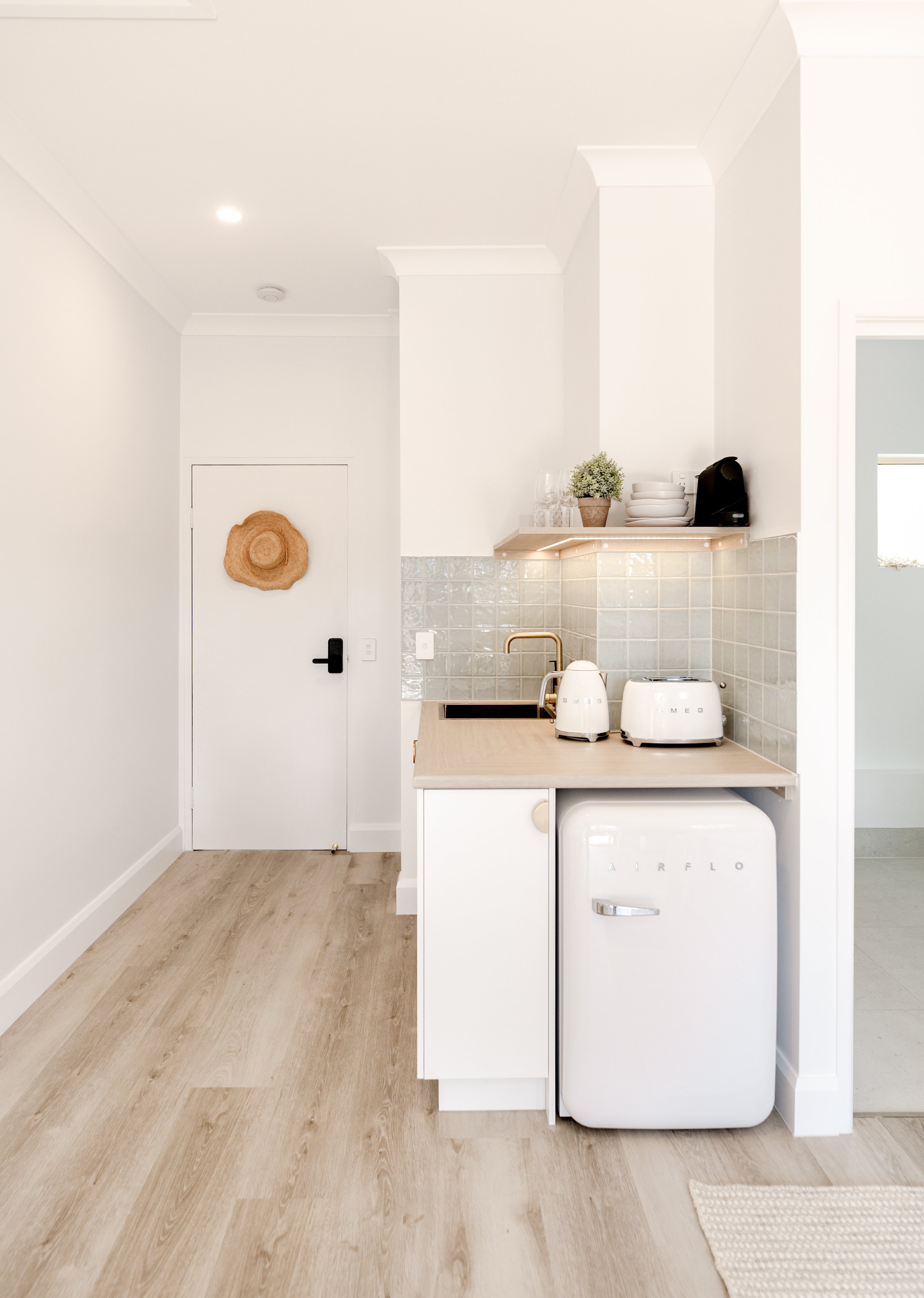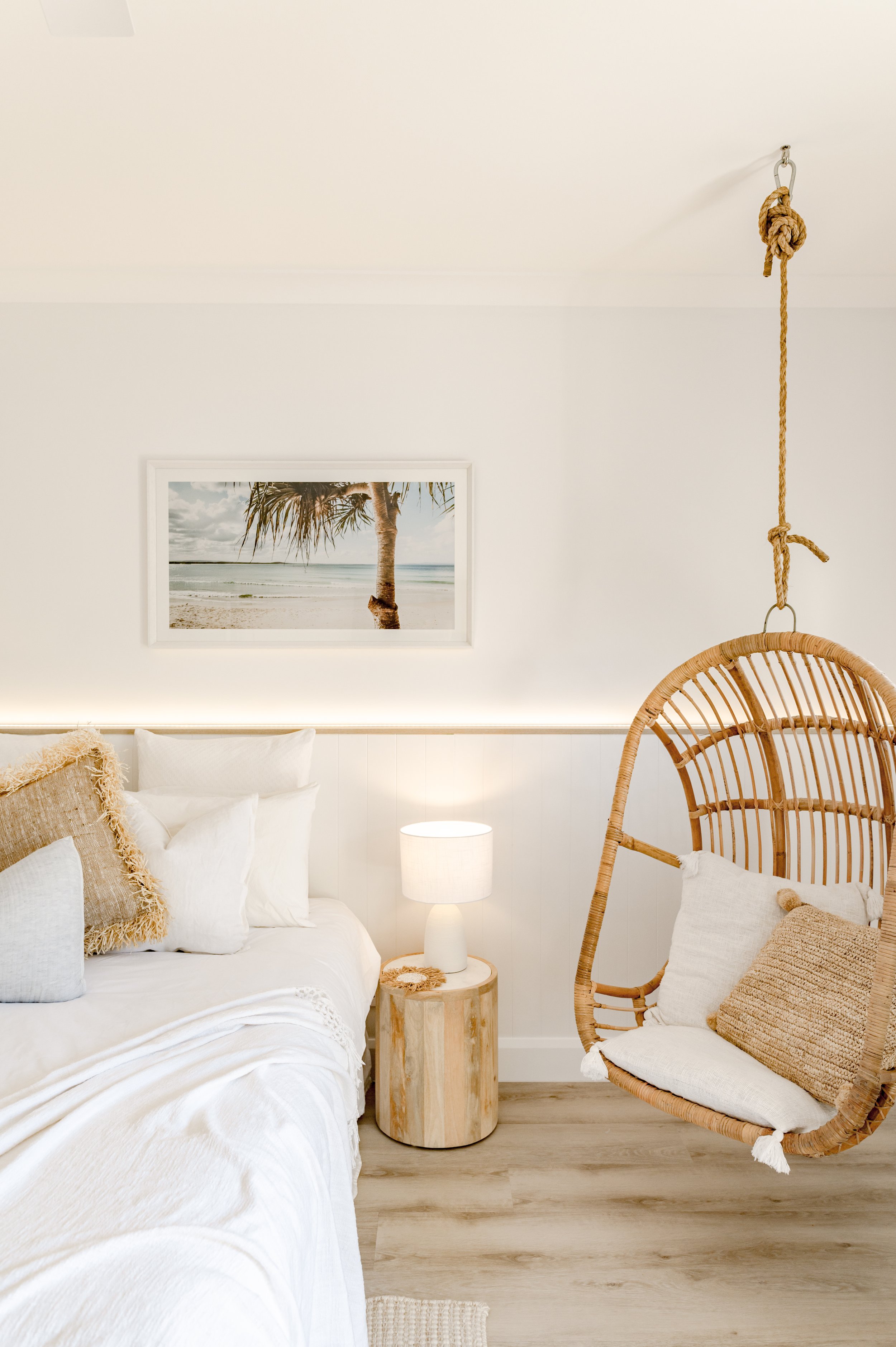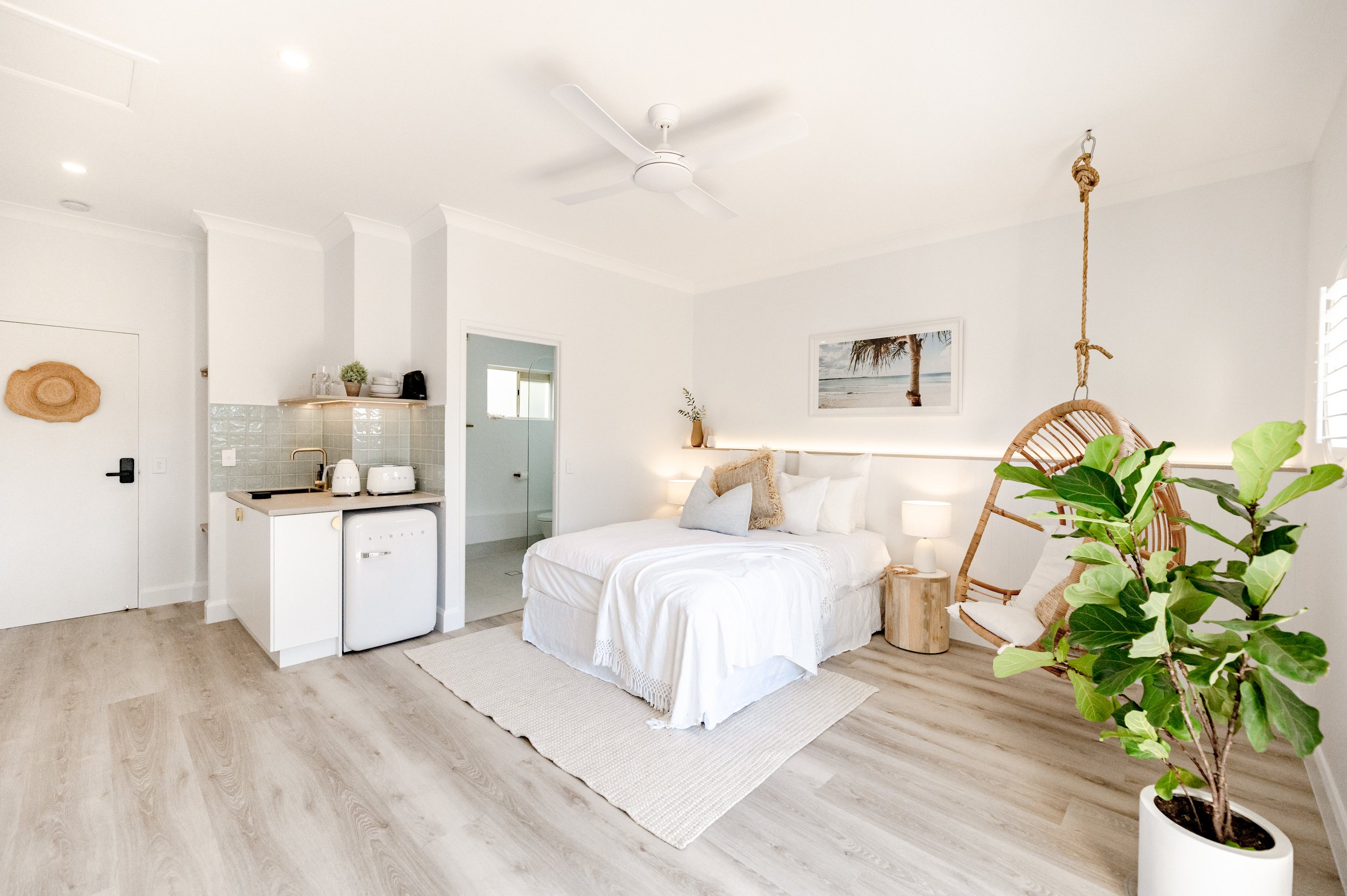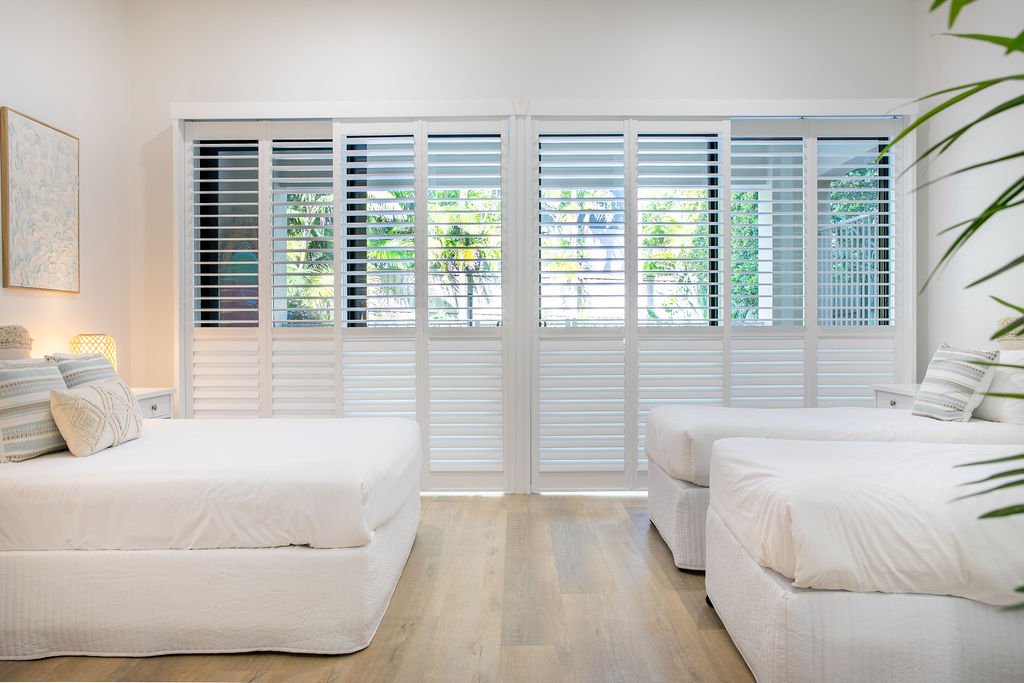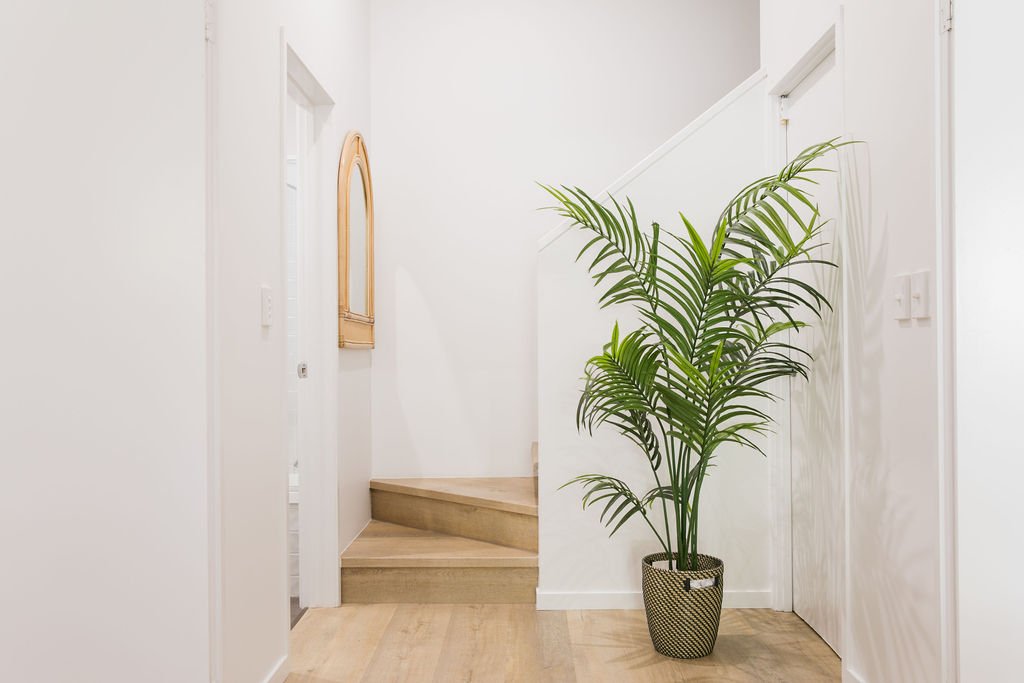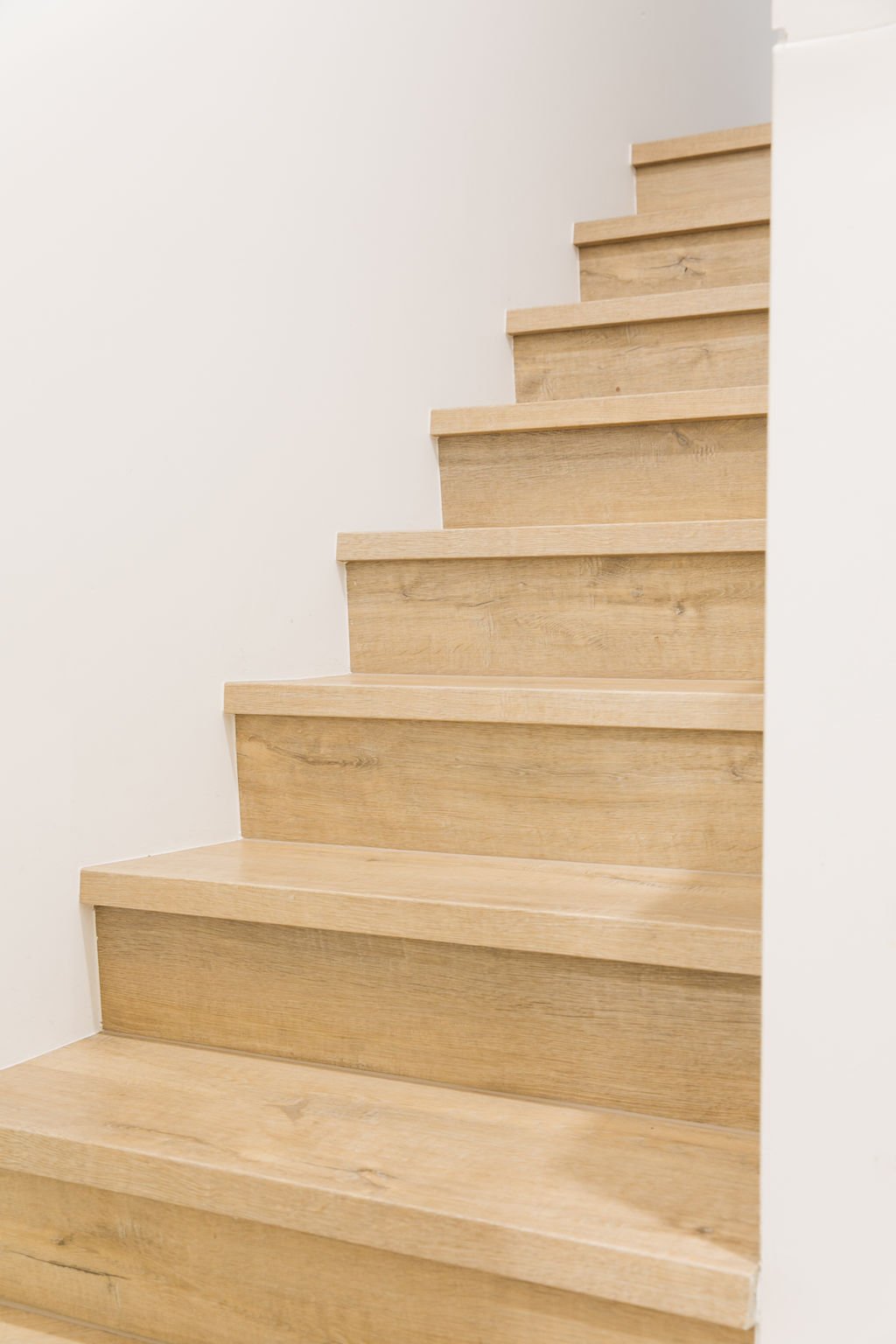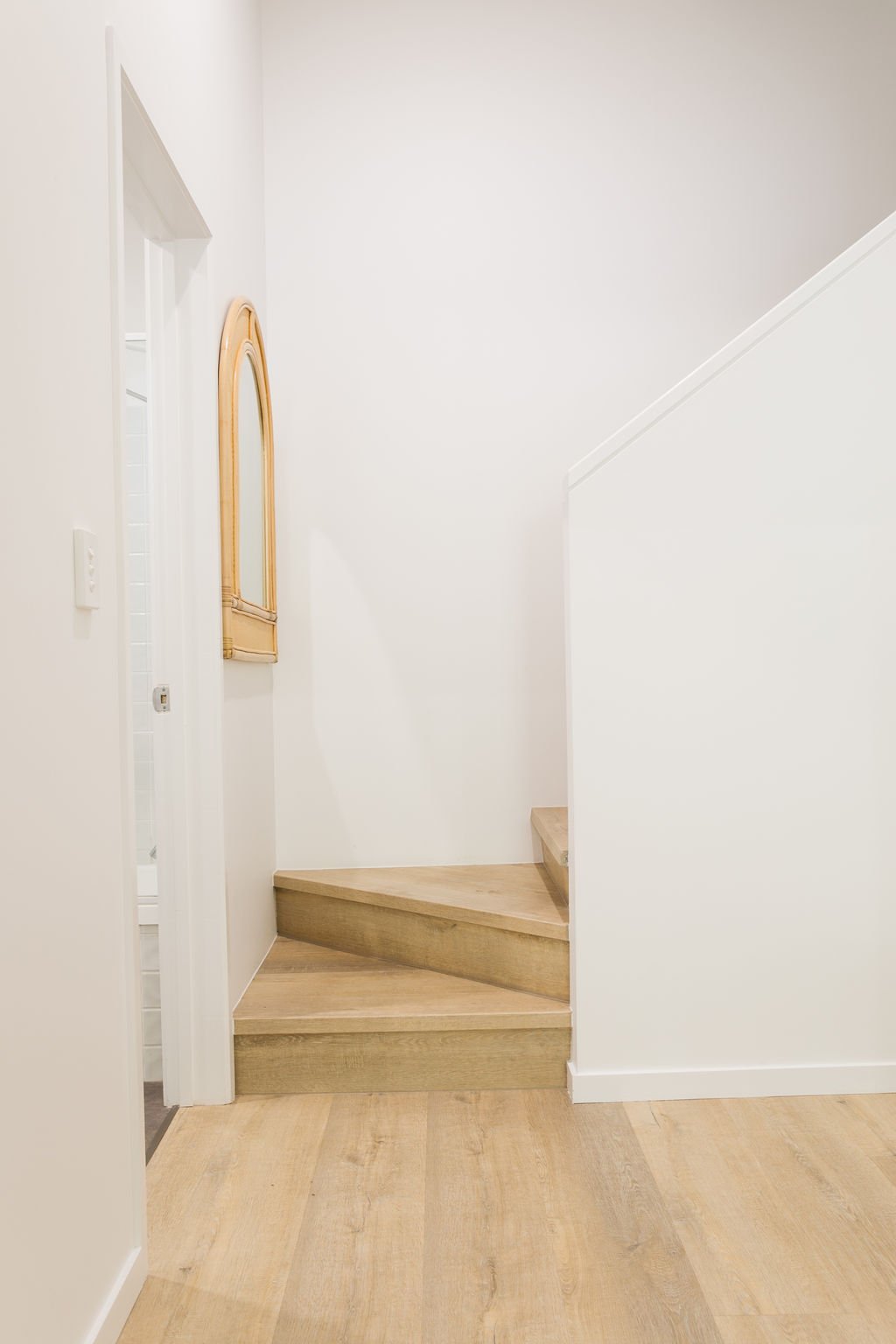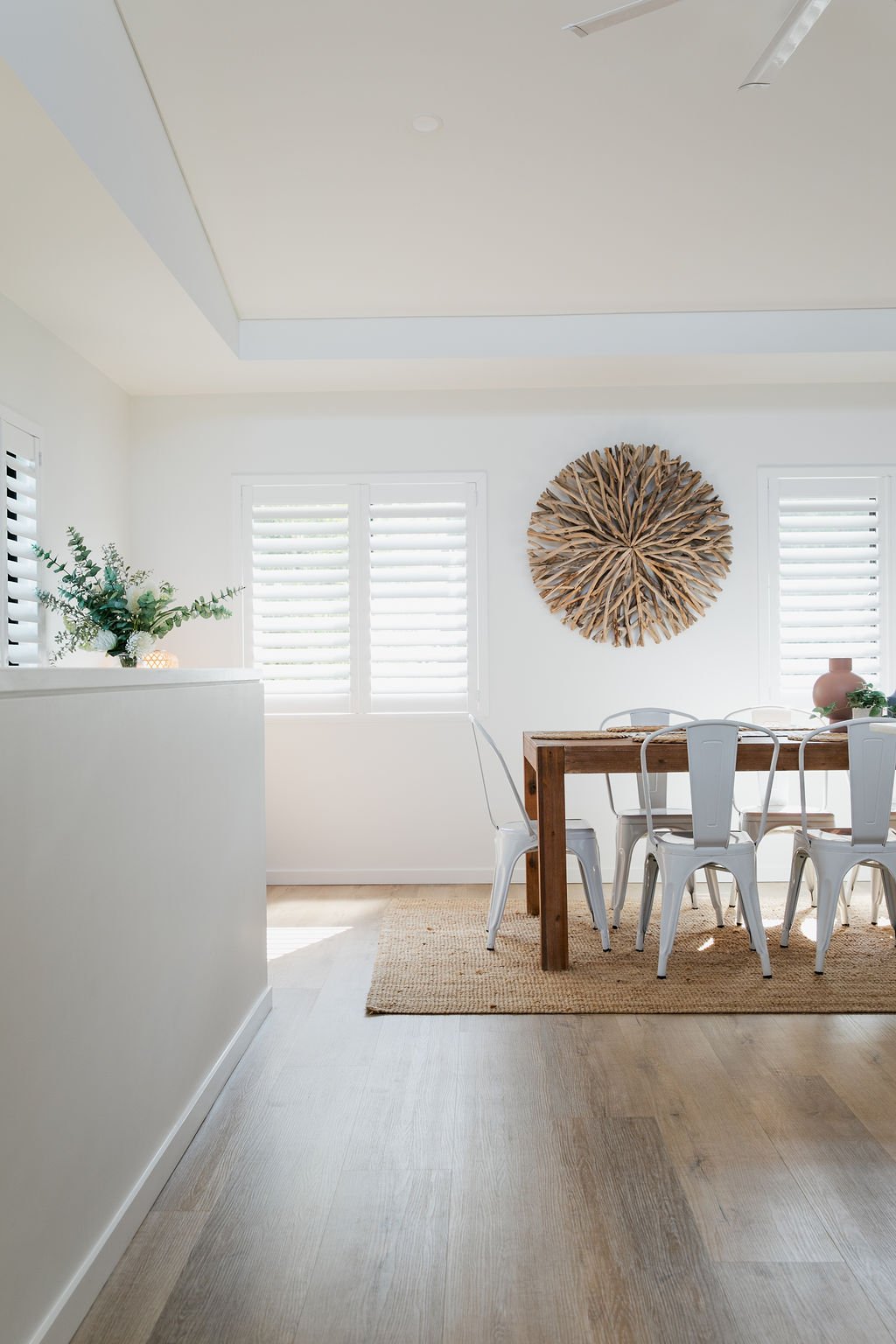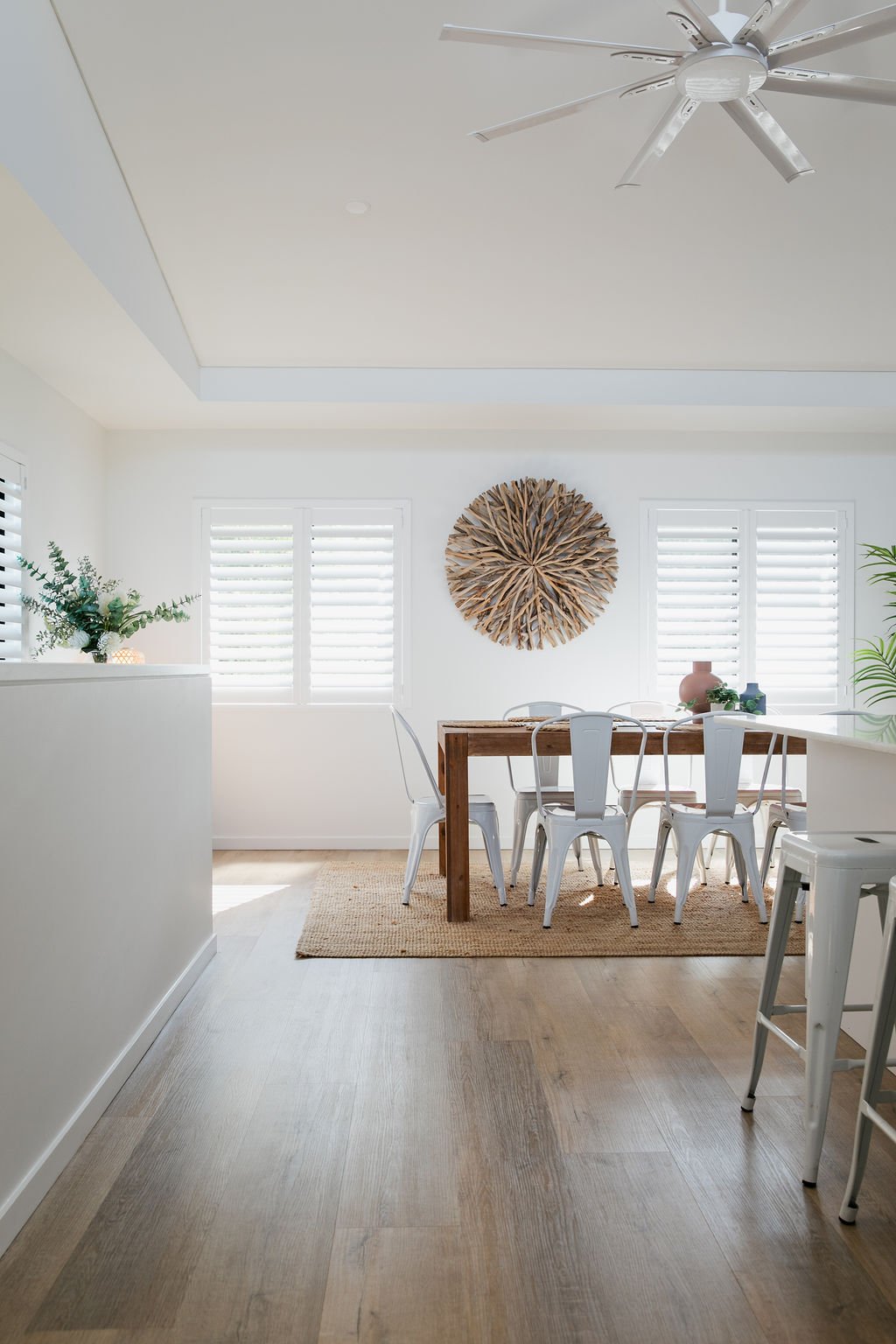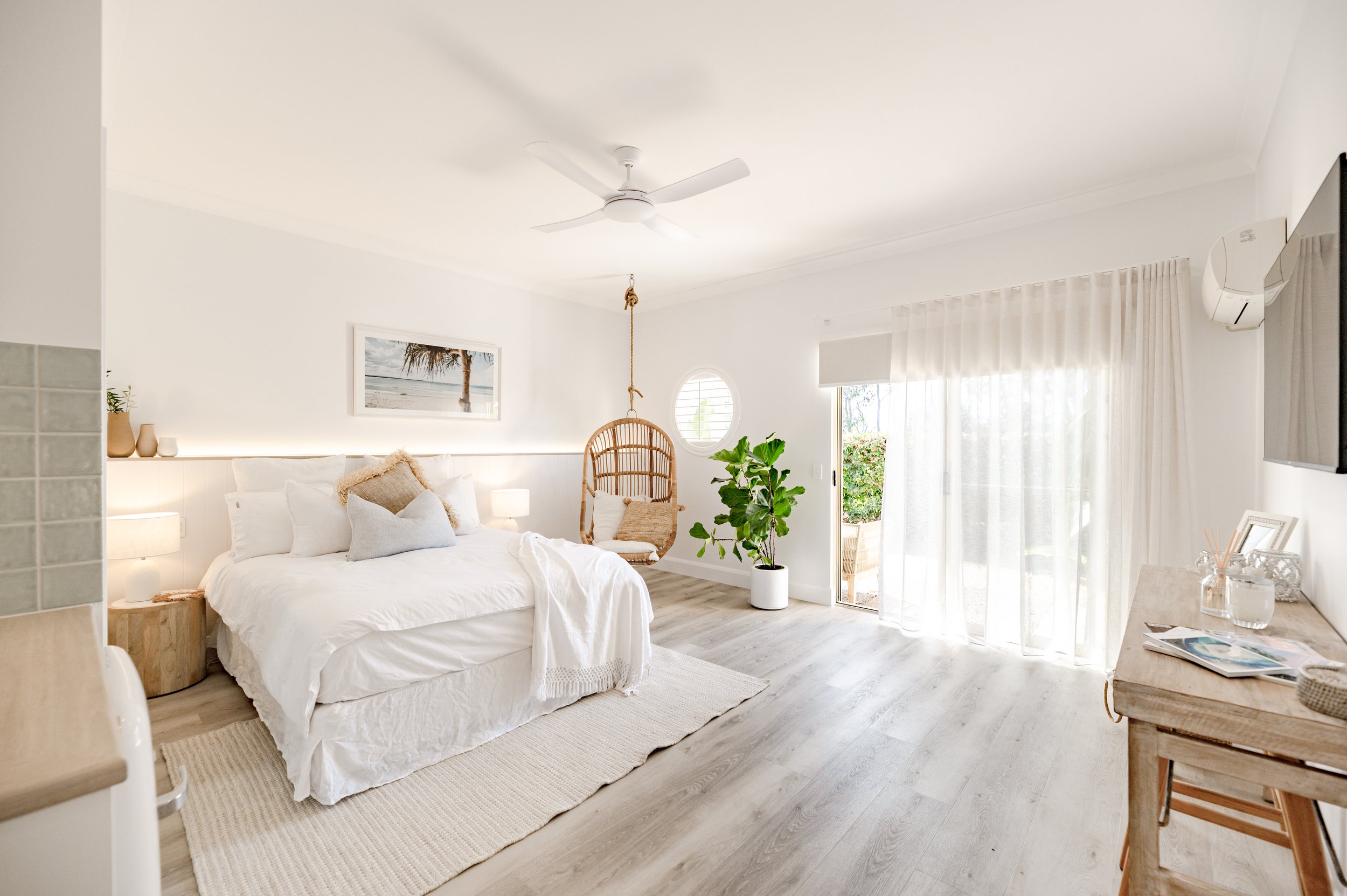
Resilient Hybrid Flooring Sunshine Coast
REVOLUTIONARY / TOUGH / WATERPROOF / PET FRIENDLY
Hybrid flooring represents the latest in revolutionary technology
With its super tough rigid core, hybrid flooring encompasses a mix of the best in vinyl and laminate flooring. Hybrid flooring on the Sunshine Coast is a very resilient floor covering, being 100% waterproof and equipped to withstand direct heat and extreme cold. Even with underfloor heating or fluctuating temperatures, the boards expand and contract minimally. This means no lifting, cracking or buckling of your flooring as the temperature changes.
The same technology that makes hybrid flooring waterproof, also keeps it odour proof, making it perfect for homes with pets. Along with odour proofing, it also contains special scratch and stain proof technology, ensuring pet claws will not penetrate the top layer.
Coverings Breeze Hybrid Flooring collection: made with true core technology.
Featuring a deluxe blend of Australian species, Breeze is a first-class hybrid product. Engineered with the latest True Core technology, Breeze has an aerated core, giving it both strenght and flexibility. Breeze offers comfort and quieteness underfoot and is silica and limestone free.
Plank size: 228mm x 1524mm
Total thickness: 6.5mm
Wear layer: 0.5mm
Qty per carton: 8 pcs
Area per carton: 2.78m2
Slip rating: P3
Specifications
Benefits of Hybrid flooring:
Waterproof: Hybrid vinyl planks are 100% waterproof and can be used in residential and commercial applications.
Durable: Featuring a rigid core with the top coating of a laminate, these planks are dent, scratch, stain and UV resistant. Hybrid vinyl planks will hold up to pets, kids and foot traffic.
Appearance: Hybrid flooring is eye catching, with imaging technology, texture and edges that mimic the real look and feel of traditional hardwoods, but without the maintenance.
DIY Installation: It features the same tongue and groove click locking system as laminates and vinyls. For the DIYer, these can be easily installed with minimal equipment.
Commercial Projects: It is a great option for commercial spaces. Not only do you get the waterproof qualities of vinyl, but you also get the surface durability, stain resistance and fade resistance of a laminate.
Comfort: It features a rigid core construction that is dense and thicker than traditional vinyl flooring. If you choose a hybrid floor with attached underlayment or opt for an underlayment beneath your floor, you will have added cushion and sound absorption.
Sound: With a laminate or hardwood, you may have a hollow sound when you walk on your floor. With the rigid core technology, you will have a very solid step which should produce little sound.
Easy Maintenance and Cleaning: A hybrid floor only requires regular sweeping and spot cleaning with a deeper weekly clean.
Frequently Asked Questions About Hybrid Flooring on the Sunshine Coast
-
Hybrid and engineered timber flooring are two popular options for homeowners, each with its own characteristics and benefits. Here's a breakdown of the key differences between the two:
Construction
Hybrid flooring: Hybrid flooring consists of multiple layers, typically including a rigid core layer made of materials like limestone composite or PVC, a printed design layer, and a protective wear layer. These layers are typically fused together to create a durable and resilient flooring option.
Engineered timber flooring: Engineered timber flooring is constructed using layers of real wood veneer on top of a plywood or high-density fiberboard (HDF) core. The veneer layer provides the authentic appearance of solid timber, while the core adds stability and strength.
Moisture Resistance
Hybrid flooring: Hybrid flooring is highly water-resistant, making it suitable for areas with high moisture levels, such as bathrooms and kitchens. It can withstand spills and damp conditions better than traditional hardwood flooring.
Engineered timber flooring: While engineered timber flooring has some level of resistance to moisture due to its construction, it is not as impervious to water as hybrid flooring. It is generally not recommended for installation in areas with high moisture, such as bathrooms.
Durability
Hybrid flooring: The rigid core of hybrid flooring provides excellent durability, making it resistant to dents, scratches, and wear. It is designed to withstand heavy foot traffic and can be a good choice for busy households or commercial spaces.
Engineered timber flooring: Engineered timber flooring is also quite durable, but its resistance to wear and tear may depend on the thickness of the veneer layer. Thicker veneer layers allow for more sanding and refinishing over the lifespan of the flooring.
Installation
Hybrid flooring: Hybrid flooring is typically installed as a floating floor, which means it is not directly attached to the subfloor. It can be installed quickly and easily using click-lock mechanisms.
Engineered timber flooring: Engineered timber flooring can be installed as a floating floor or glued down, depending on the specific product and installation requirements. The glued-down installation provides a more stable feel but may require professional assistance.
Appearance
Hybrid flooring: Hybrid flooring can mimic the look of various flooring materials, including timber, stone, and tile. It often comes in a wide range of designs and finishes to suit different aesthetics.
Engineered timber flooring: Engineered timber flooring offers the natural beauty and warmth of real wood. The top veneer layer can be sourced from different timber species, allowing for a diverse range of colours, grains, and textures.
-
Hybrid flooring offers several advantages over vinyl flooring, which contribute to its popularity among homeowners. Here are some reasons why hybrid flooring is considered better than vinyl flooring:
#1 - Realistic Appearance: Hybrid flooring often features high-quality printing technology that creates a realistic and authentic look of natural materials, such as timber or stone. It can closely mimic the aesthetic appeal of hardwood flooring, providing a more luxurious and elegant appearance compared to vinyl flooring.
#2 - Enhanced Durability: Hybrid flooring is designed to be extremely durable and resilient. It typically consists of a rigid core layer made of materials like limestone composite or PVC, which offers excellent impact resistance and can withstand heavy foot traffic without denting or scratching. In contrast, vinyl flooring may be more susceptible to dents and scratches, especially in high-traffic areas.
#3 - Moisture Resistance: Hybrid flooring has a higher level of moisture resistance compared to vinyl flooring. While vinyl flooring is generally water-resistant, hybrid flooring is often waterproof, meaning it can tolerate exposure to water and moisture without warping or damage. This makes hybrid flooring suitable for installation in areas prone to spills or high humidity, such as kitchens, bathrooms, and laundry rooms.
#4 - Stability: The rigid core of hybrid flooring provides stability and dimensional integrity, which helps prevent the flooring from expanding or contracting significantly due to temperature and humidity fluctuations. Vinyl flooring, especially thin or low-quality options, may be more susceptible to movement and changes in shape under varying conditions.
#5 - Installation: Hybrid flooring typically uses a click-lock installation system, allowing for easy and straightforward installation as a floating floor. It does not require adhesive or extensive subfloor preparation. Vinyl flooring installation can also be relatively simple, but it often requires a smooth and levelled subfloor, and some types of vinyl flooring may need adhesive for installation.
#6 - Comfort and Sound Absorption: Hybrid flooring tends to offer a more comfortable underfoot feel compared to vinyl flooring. The rigid core of hybrid flooring provides a solid foundation while still offering some degree of cushioning. Additionally, hybrid flooring can reduce noise transmission and impact sound, making it a quieter option for homes compared to vinyl flooring.
It's worth noting that both hybrid flooring and vinyl flooring have their own merits and are suitable for different applications. Vinyl flooring may be more budget-friendly and still offers good durability and ease of maintenance.
Ultimately, the choice between hybrid flooring and vinyl flooring will depend on your specific needs, preferences, and budget.
-
Hybrid flooring is generally considered easy to install, especially when compared to traditional flooring options like solid hardwood or tile. Here are a few reasons why our Sunshine Coast customers turn to hybrid flooring:
Click-Lock System: Hybrid flooring often utilises a click-lock installation system, which involves interlocking the planks together. This system eliminates the need for adhesives or nails, making the installation process quicker and more straightforward. The planks can be easily connected by aligning the tongue and groove edges and clicking them into place.
Floating Floor Installation: Hybrid flooring is commonly installed as a floating floor, which means it is not directly attached to the subfloor. The planks are laid on top of an underlayment, providing stability and cushioning. This installation method allows for flexibility and makes it easier to remove or replace individual planks if needed.
Minimal Subfloor Preparation: Hybrid flooring can often be installed over various types of subfloors, including concrete, plywood, or existing flooring like tiles or laminate. The subfloor usually needs to be clean, dry, and level, but extensive preparation or levelling is generally not required. However, it's important to follow the manufacturer's guidelines for subfloor requirements and preparation to ensure a successful installation.
DIY-Friendly: Hybrid flooring is considered a suitable option for DIY installation due to its user-friendly features. With the click-lock system and floating floor installation, homeowners with basic tools and some handy skills can often tackle the installation themselves, potentially saving on labour costs. However, it's still recommended to follow proper installation instructions and seek professional assistance if needed, especially for complex areas or larger projects.
While hybrid flooring is generally easy to install, it's important to note that proper installation techniques and attention to detail are crucial to achieving the best results. If you're unsure about the installation process or have specific concerns, get in touch with a member of our experienced team to ensure a successful and long-lasting installation.
-
Hybrid flooring typically consists of multiple layers, including a rigid core layer, a printed design layer, and a protective wear layer. The materials used in hybrid flooring can vary depending on the manufacturer and specific product, so it's important to check with the manufacturer or supplier for detailed information about the composition and potential toxins.
That being said, hybrid flooring generally tends to have low levels of toxins compared to some other flooring options. Here are a few reasons why hybrid flooring is often considered a low-toxin choice:
VOC Emissions: Volatile Organic Compounds (VOCs) are chemicals that can be released as gases from certain materials, including some types of flooring. These VOC emissions can contribute to indoor air pollution and may cause health concerns. Hybrid flooring typically has low VOC emissions, especially when compared to certain types of vinyl flooring or laminate flooring. Many manufacturers prioritise the use of low-VOC or VOC-free materials in their hybrid flooring products.
Certification and Compliance: Reputable manufacturers often adhere to industry standards and certifications to ensure their products meet certain safety and environmental requirements. For example, some hybrid flooring products may be certified by organisations like FloorScore® or GREENGUARD, which evaluate and certify products for low VOC emissions and indoor air quality.
Material Selection: The composition of hybrid flooring often includes materials that are known for their low toxicity. The rigid core layer may be made of materials like limestone composite or PVC, which can be chosen for their stability and durability while minimising potential toxins. The wear layer, which provides protection and durability, is typically made of a clear coating that is designed to be resistant to scratches and stains.
-
A thicker hybrid floor can offer certain advantages in terms of underfoot comfort and sound insulation, but the overall quality and performance of the flooring are influenced by multiple factors. Here are some considerations regarding the thickness of hybrid flooring and its impact on underfoot feel:
Comfort: A thicker hybrid floor generally provides more cushioning and a softer feel underfoot. The additional thickness can help absorb impact and make walking or standing more comfortable, especially over long periods. Thicker hybrid flooring may be preferred in areas where comfort is a priority, such as bedrooms or living rooms.
Sound Insulation: The thickness of the hybrid floor can contribute to sound insulation properties. A thicker floor can help reduce the transmission of noise, minimising the sound of footsteps and impact noise that travels to the rooms below. This can be particularly beneficial for multi-level buildings or apartments.
Subfloor Conditions: The condition of the subfloor can also influence the underfoot feel. A thicker hybrid floor can better bridge minor imperfections in the subfloor, resulting in a smoother and more even surface. However, it's important to note that significant subfloor irregularities may require levelling or preparation regardless of the floor thickness.
Overall Quality and Construction: The thickness of the hybrid floor alone does not determine its quality or performance. Other factors such as the quality of materials, construction, and manufacturing processes also play a crucial role. It's essential to consider the overall durability, stability, and wear layer characteristics of the hybrid flooring, in addition to thickness, to ensure a long-lasting and high-quality product.
Brands We Supply
Major Brand Suppliers

















Why Choose Us
25 Years of Experience
Up to 25 Year Product Warranty
Free Quote & Measure
Australian Made Products
Free Colour Consultation
Custom Design
Client love notes
-
“We are so thrilled with our window coverings. It is so hard to think that it has been a year since we moved in.”
Jan and Jim Christian
-
“Coverings Noosaville have taken their business to a new level. Its a fantastic experience to visit their showroom. Most Coverings Showrooms look like they have come from the mid century and are typically bleak and unimaginative. The products displayed are very appealing. Systems are app driven and sleek. Messaging and a smooth process is top class. Rate the team very highly“
Cheryl Nash
-
“Fantastic local company. Very prompt from quoting to installation. Excellent customer service and a very high quality product. Would 100% recommend using Coverings Sunshine Coast.“
Merrick Davis



